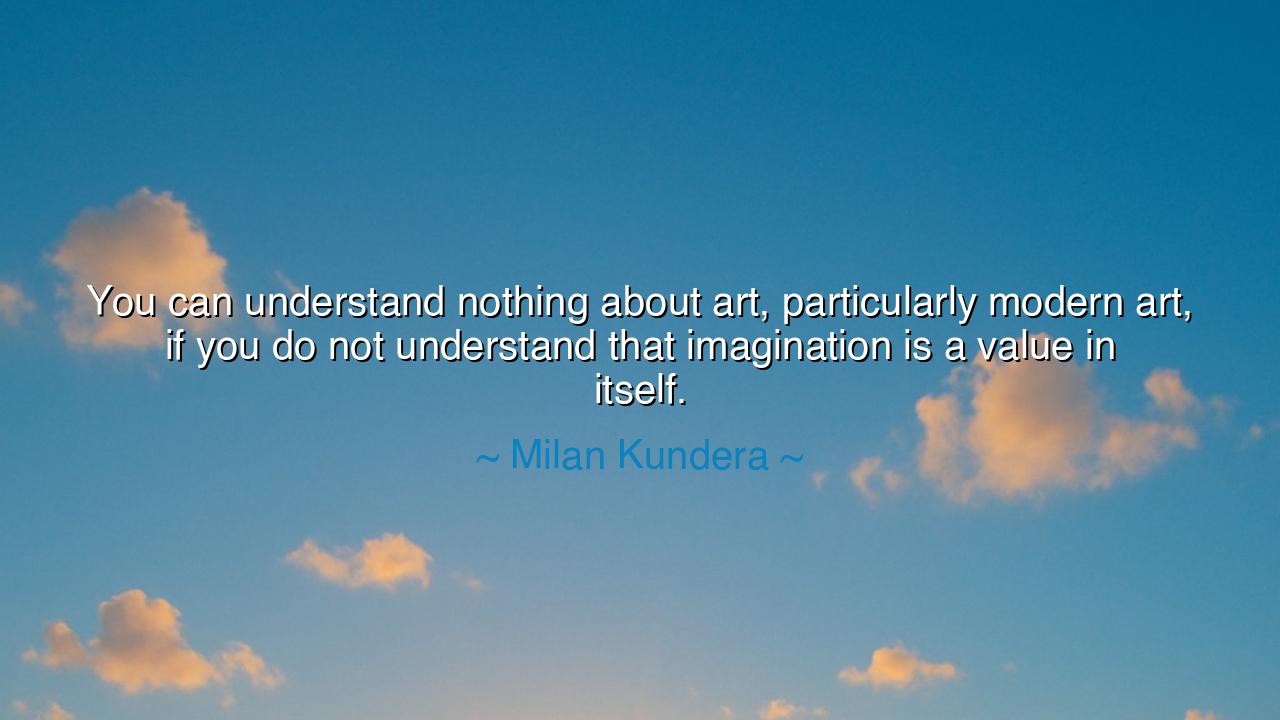
You can understand nothing about art, particularly modern art, if
You can understand nothing about art, particularly modern art, if you do not understand that imagination is a value in itself.






When Milan Kundera declared, “You can understand nothing about art, particularly modern art, if you do not understand that imagination is a value in itself,” he spoke with the authority of one who had walked the borderlands between reason and dream, between history and creation. His words remind us that imagination is not an ornament of the mind—it is a value, a principle of being, a force as essential to the human spirit as air to the lungs. To Kundera, art—especially modern art—is not the mirror of the world but the creation of a new one. Its meaning lies not in imitation, but in invention; not in representing what is, but in revealing what could be. And to see this truth, one must first understand that imagination is sacred, sufficient, and real.
The origin of this insight comes from Kundera’s lifelong struggle against the dullness of conformity. Born in a time when ideology sought to cage the mind, he witnessed how totalitarian systems tried to suppress imagination, to make all art serve propaganda and utility. Against this tyranny of usefulness, Kundera raised his voice. He saw that when a society loses its respect for imagination, it loses its freedom. To him, modern art—abstract, surreal, experimental—was not madness or chaos, but rebellion. It proclaimed that imagination itself has value, independent of logic, politics, or profit. It did not need to justify itself by teaching, pleasing, or serving; it was its own justification, a celebration of the boundless human mind.
To understand art, Kundera teaches, one must abandon the hunger for explanation. The modern artist does not ask, “What does this mean?” but rather, “What can this become?” The imagination is not a tool for constructing something useful—it is the source of wonder, of possibility, of the infinite. When Picasso painted faces with many eyes, or when Kandinsky gave music the form of color, they were not depicting reality but expanding it. To those who demanded that art “make sense,” Kundera’s reply was simple: imagination itself makes sense, for it is the heart’s way of thinking. Without imagination, there is no art—only replication; no life—only routine.
Consider the story of Marc Chagall, who painted villages that floated, lovers who soared above the rooftops, and animals that danced in the sky. To the realist, his art made no sense; to the dreamer, it made all the sense in the world. Chagall once said that his paintings were “not of the world as it is, but as it might be.” This is the truth that Kundera defends. The imagination, in its purest form, does not imitate the visible—it gives shape to the invisible. It reminds humanity that reality is not fixed, that the world is forever being born anew in the soul of the artist. The value of imagination is that it rescues the mind from servitude to what already exists.
And yet, Kundera’s teaching reaches beyond the gallery or the page—it speaks to all who live. For if imagination is a value, then it must be practiced not only in art, but in life itself. The one who cannot imagine cannot truly love, forgive, or hope. The one who cannot dream cannot build a better world. Every act of compassion, every scientific breakthrough, every moral awakening begins as an act of imagination—a vision of something not yet real, but possible. To live without imagination is to live without vision; to live without vision is to live in chains.
Kundera’s wisdom also carries a warning: that in our age of efficiency and data, imagination is in peril. The modern mind, intoxicated by practicality, often demands that everything must serve a purpose. Art must teach; literature must instruct; beauty must be justified. But imagination does not submit to such demands. It is free, and its freedom is its glory. The more we measure it by its utility, the more we destroy it. As Kundera reminds us, art must never apologize for being mysterious, and imagination must never be reduced to a servant of reason. For imagination does not exist to explain the world—it exists to remind us that the world is not yet finished.
So, my listener, take this teaching to heart: honor your imagination as you would a sacred flame. When you encounter art, do not rush to analyze it; let it speak to your inner vision. When you create, do not ask, “Will this be useful?”—ask instead, “Does this make me alive?” And when you walk through the world, dare to see not only what is, but what might yet be. Let your imagination become your compass, your teacher, your companion. For in the end, the greatest truth of Milan Kundera’s wisdom is this: that imagination is not the opposite of reality—it is its continuation, its expansion, its redemption.
Thus remember: to live fully, one must live imaginatively. To understand art, one must see beyond the surface of things. To understand life, one must recognize that imagination is not a luxury, but a value—the living proof that the human spirit is infinite, and that every soul carries within it the power to dream the world anew.






AAdministratorAdministrator
Welcome, honored guests. Please leave a comment, we will respond soon